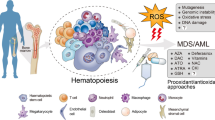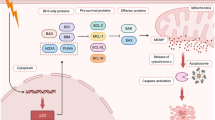Abstract
Cell killing of L1210 cells by cisplatin has been studied using flow cytometry and DNA gel electrophoresis. Ten hours after a supralethal dose of drug (100 microM), extensive apoptosis was induced. Cells were also susceptible to the induction of apoptosis by nutritional deprivation, for example by incubation in arginine-deficient medium. After treatment in full medium with doses of drug in the range 1-10 microM, cells experienced a slow-down in S-phase transit followed by a G2 block. Cells either overcame the G2 block and continued to cycle or enlarged and eventually died. There was no evidence to suggest that cells dying from the G2 block underwent apoptosis. The data were consistent with a dual mechanism of cell death-higher doses of drug led to rapid death through apoptosis; lower doses led to death at later times resulting from failure to overcome a block in G2.
Similar content being viewed by others
Author information
Authors and Affiliations
Rights and permissions
About this article
Cite this article
Ormerod, M., Orr, R. & Peacock, J. The role of apoptosis in cell killing by cisplatin: a flow cytometric study. Br J Cancer 69, 93–100 (1994). https://doi.org/10.1038/bjc.1994.14
Issue Date:
DOI: https://doi.org/10.1038/bjc.1994.14
- Springer Nature Limited
This article is cited by
-
Cisplatin resistance-related multi-omics differences and the establishment of machine learning models
Journal of Translational Medicine (2022)
-
Recent applications and strategies in nanotechnology for lung diseases
Nano Research (2021)
-
Cytotoxic platinum(II) complexes derived from saccharinate and phosphine ligands: synthesis, structures, DNA cleavage, and oxidative stress-induced apoptosis
JBIC Journal of Biological Inorganic Chemistry (2020)
-
In vitro toxicity of different-sized ZnO nanoparticles in Caco-2 cells
Nanoscale Research Letters (2013)
-
Potential cytotoxic and apoptosis inducing agents: synthesis and evaluation of methoxy-substituted chalcones against human lung and cervical cancers
Medicinal Chemistry Research (2013)




